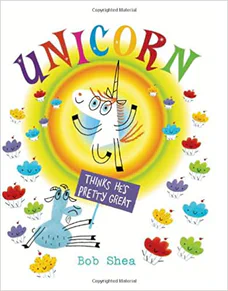Unicorn Thinks He’s Pretty Great

Recommended Age Range: Preschool through 2nd grade.
Publisher's Summary:
Ever since Unicorn moved into the neighborhood, Goat has been feeling out of sorts. Goat thought his bike was cool—until he saw that Unicorn could fly to school! Goat made marshmallow squares that almost came out right, but Unicorn made it rain cupcakes! Unicorn is such a show-off, how can Goat compete? When Goat and Unicorn share a piece of pizza, Goat learns that being a unicorn might not be all it’s cracked up to be. And when Unicorn shows his admiration for Goat, it looks like the beginning of a beautiful friendship.

Dr. Annie's Takeaways
Recommended for: This book is a fun, silly read that can start conversations about jealousy, perspective-taking, and self-esteem. It’s ideal for a child who has criticized, rejected, or even bullied someone due to feelings of insecurity or jealousy (as Goat initially does in this story). It’s less ideal for someone who has been on the receiving end of this. Children are often told that someone is being mean to them because they are “just jealous,” and although this is well-intentioned and sometimes true, it can come off as invalidating or even overly permissive of hurtful behaviors.
Would a child like it? Many children will really like this book. It has kid-appropriate irreverence and a sweet ending. Some children might be a bit unsettled by Goat’s meanness at the beginning of the story.
Tone: Silly, irreverent
Story Quality: This story is likely to make a lot of kids (and the adults reading with them) laugh, but it also teaches an earnest lesson–that no one is perfect, you never know what’s going on for someone else, and we all have our own unique strengths.
Illustrations: Fun, zany illustrations that look like a combination of watercolor, pen, and crayon.
Representation: The story is written from the first person perspective of Goat. Unicorn is male (he uses he/him pronouns).
Psychological Practices: This story can be used as a fun introduction to the idea that no one is perfect (even if it seems like they are) and that everyone has strengths they might be taking for granted. This is a useful line of thinking when coping with jealousy. In this story, Goat is initially angry at Unicorn, and it’s obvious to adult (and some child) readers that Goat is jealous of him. This isn’t explicitly stated, though, and if a child doesn’t understand what’s going on, it would be a good opportunity to help a child build insight into this feeling. Over goat cheese pizza (don’t think about it too hard), Unicorn shares what he admires about Goat, which makes Goat realize that Unicorn isn’t actually better but rather they both have their own strengths. This perspective could be quite helpful for a child who gets stuck feeling jealous of other kids (e.g., who have things they don’t have, who find a subject easier than they do, etc.).
Concerns: I wish that this book had ended with Goat lifting up Unicorn in the same way that Unicorn lifted up Goat. Instead, it ends with Goat feeling good about themself and wanting to be friends with Unicorn. It’s fine, but it would have been the start of a more balanced friendship if Goat had reciprocated the support that Unicorn provided them. A brief heads up: there’s a line when Unicorn criticizes his own non-cloven hooves and says “Stupid regular hooves” which might be a concern to some families and could be a problem for kids who might imitate this line.
